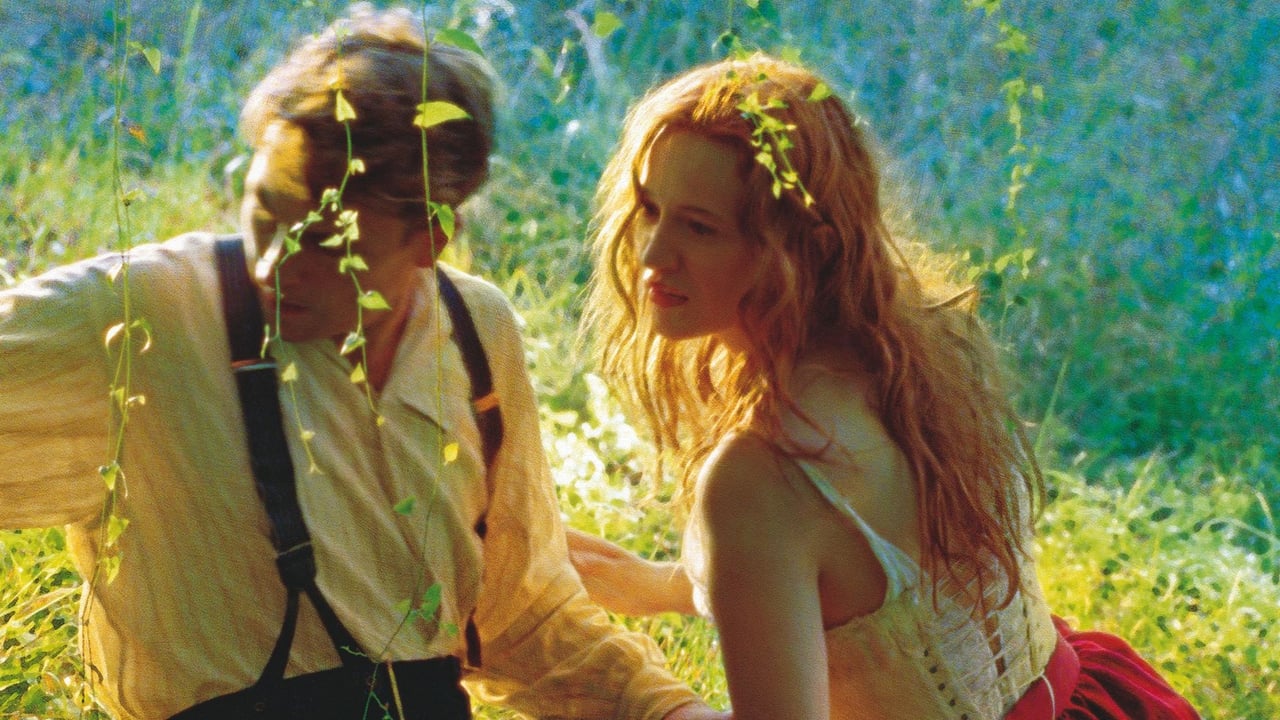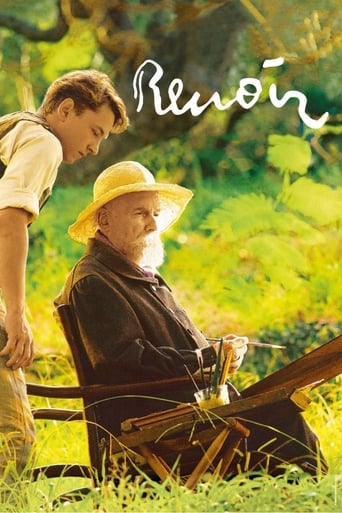



everything you have heard about this movie is true.
View MoreThis is a small, humorous movie in some ways, but it has a huge heart. What a nice experience.
View MoreThis is a gorgeous movie made by a gorgeous spirit.
View MoreThis is a dark and sometimes deeply uncomfortable drama
View MoreAnd to think I almost didn't see this film because of its ridiculously low IMDb rating. Are those now skewed by investment bankers, flash traders, and other impatient shills of Satan who find the pace of films like Renoir glacial? What a shame, if so. This film recounts and humanizes the final years of one of the world's most revered painters, one who rejected the title of artist. It is an Impressionistically rendered portrait (worth seeing for the Mediterranean light alone) that sparely and delicately portrays a cascade of relationships: between a father and a son 53 years younger, an arthritic painter who came to his métier in his fourth decade and a tempestuous adolescent model, the regenerative radiance of untrammeled eros, a love triangle, a female entourage who devotedly care for and carry le Patron wherever he will paint, a duty-bound WW I biplane pilot and a feisty fetishized lover, a latent filmmaker who here begins shedding his timorous, jejune indifference and later won international renown.It is a masterpiece, a visual, gustatory, and vocal feast, yet one from which music is mostly absent. A lingering, sequestered fin-de-siècle world from which war was mostly distant. A microcosm where vital energy in all its guises was evoked and honored. It prompts you to take in the light, the space, the nourishing gusts from the Mediterranean, the temperate, fertile verdure, the French cadences of early-20th-century rural France.Why so much talk among reviewers of abundant female "nudity" and "nakedness"? After a scene or two, it goes almost unnoticed, so naturally did it blend with the Edenic environs.The film is, perhaps above all, a condensed history of a family permeated by quiet genius and love of art and the arts. One somehow senses its origins and dénouements without being told of them.Renoir (the film) had deficits that others more critically competent than I have detailed. But it's tempting to begrudge Jacques Renoir, Gilles Bourdos and Jérôme Tonnerre the laconic textual bio of Andrée Heuschling (Christa Theret) that rolled by just before the credits. It asserted, not without Schadenfreude, that after her breakup with Jean Renoir in 1931 (not covered in the film), Andrée fell into a life of "obscure poverty".Yet no one actually knows what became of her. Could she not, for all we know, have bested Jean's fate? Might she have found her way to a Sardinian isle like the one where Lina Wertmüller shot Swept Away? A reclusive Impressionist may have offered to make a breezy, clothing-optional life with her in a cliff-side villa there (or so the sequel I'm planning has it). Only Heuschling, unlike Wertmüller's Raffaella, this time opted to stay put and leave the painted porcelain intact.
View MoreThis film is deliberately full of short scenes without apparent rational purposes. If there was one or maybe two such scenes, one might see those as plot holes or dead ends, i.e. as flaws.Personally, I see this film as an impressionistic film about a famous impressionist painter. The very thin storyline along with the numerous vignettes of the daily life of a painter, his model, his sons and his family/maids (eating, painting, cooking, talking about this and that, sleeping alone or together, bathing, or simply being idle), all filmed with the extraordinary beauty of the Côte d'Azur and its unique light which drew so many painters to the region: everything concurs to making of this film a painting on film. A painting that uses the impressionist technique: myriads of small brush strokes of colours which seem out of place, unexpected or even plain wrong, whose purpose we understand only when we look at the overall canvas once finished. Renoir is such a painting.This is a masterpiece. I found it as mesmerizing as the most beautiful impressionist paintings, whether they are by Renoir or Monet, Degas or Cézanne. I was literally transfigured by the sheer beauty of the images, and could not care less for the meaning of every little strokes of this large fresco of the beauty of nature in that region blessed by a magic sunlight... There is no pace when contemplating a painting. Everything else stops while one immerses oneself into it.And if there is one overall purpose for this movie, it is contained in the short epilogue shown at the end of the film. Jean Renoir became the famous film director of international renown, and this movie conveys the circumstances -mostly his relationship with Andrée - that led him to take this career at a time when he saw himself as mere canon fodder with nothing else after the war had ended. There are several ways to tell a story, and this is a new one. The originality of Renoir (2012), what makes this movie so unique is that it transposes a painting technique to cinema.Do not expect much action. As Pierre-Auguste Renoir says in the movie (paraphrasing) as an almost zen principle: "Do not interfere with the course of nature: picture yourself as a cork carried over by a stream, and let yourself slip away slowly as time flows by...". This is exactly how one should watch that extraordinary movie. A healthy film for the soul.
View MorePainter Pierre-Auguste Renoir (Michel Bouquet) is an ancient man by 1915. It is WWI, and his two eldest sons, Pierre and Jean (Vincent Rottiers), are at war, while his youngest, Claude (Kid with a Bike star Thomas Doret), just a boy, plays around the estate, claiming to be an orphan (his mother dead and his father an old man). Along comes a beautiful young woman (Christa Theret) who wishes to model for Renoir. Her beauty inspires the old man. Soon, Jean arrives home and begins an affair with the model (whose name is Andrée Heuschling, but who would later change her name to Catherine Hessling and star in many of Renoir's early films). This is, above all, just a very pretty movie. Very fitting, given its subject. Alexandre Desplat also provides a very gorgeous score. The story isn't hefty, but it's good. The acting is good throughout. France submitted this for the Academy Awards this year, bypassing the much more popular (and frankly better) Blue Is the Warmest Color, but Renoir is a worthy film, as well.
View MoreRenoir is a film about a person (the artist Renoir), his family, and his later life. Sorry, but there are no explosions, gun battles, or even a fist fight. The emphasis is on character and atmosphere. Thus there are scenes that seem to go nowhere, and conversations that don't seem to have significance. They are here, like the impressionist painter tries to convey a feeling. To this end, the film does very well. The viewer gets into the minds and hearts of the artist, his sons, and his model. Based mostly on fact, there of course may be some inaccuracies that may be discovered. but like an impressionistic painting, the mood is set, and the imagination does the rest.
View More